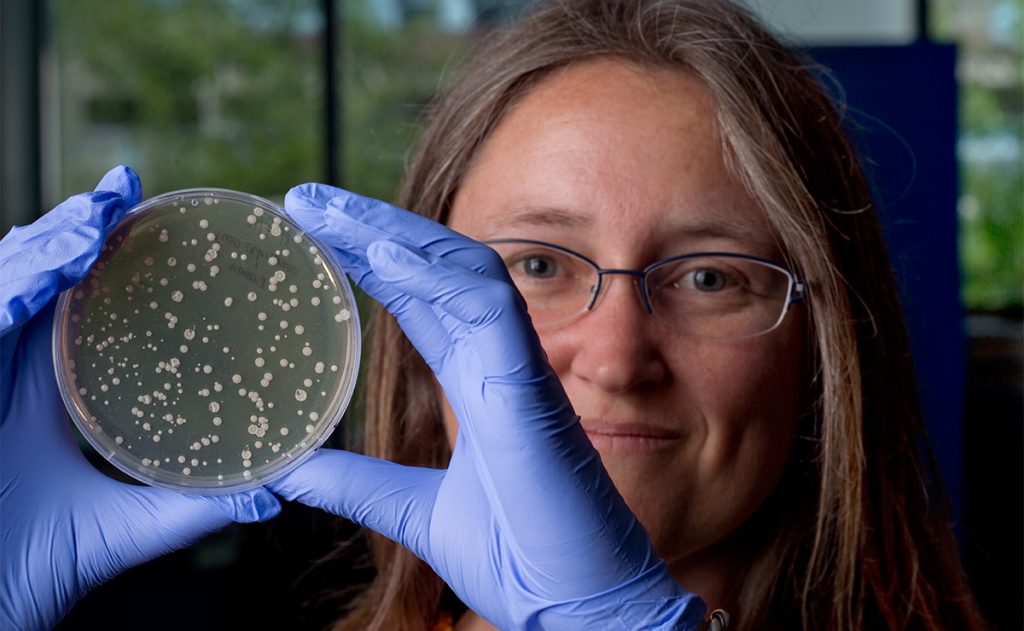
Katrine Whiteson, PhD, is on a quest to understand how microbes living in your body influence health and disease.
The human gut microbiome — a community of bacteria, fungi, viruses and other microbes that live primarily in the digestive track — has been associated with many health issues including inflammatory bowel disease, vaccination efficacy, individual responses to pharmaceuticals, diabetes and cancer. Whiteson’s curiosity about this largely unknown space has led to investigations into the relationship between dietary fiber and the microbes that reside in your gut.
“I teach undergrad classes where we have the students eat 50 grams of fiber a day. And we do that for two weeks. We take fecal samples before and after, so that we can see what happens to their microbiomes,” said Whiteson.
Whiteson said the study was inspired by a diet switch reported in Nature Communications in April 2015. People in rural South Africa swapped diets with people in Pittsburgh for just two weeks, she said, undergoing colonoscopies before and after.
“The doctors reported that the group that got more fiber saw clinically meaningful improvements. They saw big shifts in what kinds of microbes were present and fiber getting fermented into healthy molecules. Not only are we doing this with undergrads; I’m trying to expand it to cancer patients.”
Whiteson is an associate professor of molecular biology and biochemistry in the UCI School of Biological Sciences, and associate professor of pediatrics in the UCI School of Medicine. In 2022, she was named a UCI Chancellor’s Fellow, an award recognizing a body of scientific work that supports a strong trajectory towards distinction. She is also a Samueli Scholar, one of eight distinguished UCI researchers selected for the inaugural honor based on achievements that show promise for advancing basic, translational, or clinical scholarship in integrative health.
Her research connects her with investigators in nine UCI schools and other institutions. She has completed several studies with fellow Samueli Scholar Angela Fleischman, MD, PhD, associate professor of hematology oncology in the UCI School of Medicine. Their most recent investigation focused on how a Mediterranean diet can affect individuals with myeloproliferative neoplasm. Whiteson says they have observed associations between inflammation, the microbiome and cancer severity that she anticipates investigating in future diet studies.
She is developing a study that will evaluate the potential for a high-fiber diet to change the microbiome before breast cancer surgery in ways that improve outcomes. Collaborators include Fleischman, Laura Esserman, MD, director of the Carol Franc Buck Breast Care Center at UCSF; Karen Lindsay, PhD, Susan & Henry Samueli Endowed Chair in Integrative Health; and Karen Lane, MD, surgeon at UCI Health Pacific Breast Care Center.
The investigation is inspired, in part, by research from the NIH Center for Cancer Research at the National Cancer Institute (NCI) and the University of Texas MD Anderson Cancer Center, which found that patients undergoing immunotherapy with immune checkpoint blocker for advanced melanomas, who consumed at least 20 grams a day of dietary fiber, lived longer without their cancer progressing than those who consumed less dietary fiber. Study findings, reported in the Dec. 23, 2021, issue of Science, indicated that every 5-gram increase in daily dietary fiber intake corresponded to a 30% lower risk of progression of the disease.
“When people are diagnosed with cancer, there is often a window of a few weeks between their diagnosis and when they start treatment or have surgery,” said Whiteson. “The idea is to really get people’s diet in a good position before the treatment with the hope of increasing their chance of success.”
Whiteson also shares insights into diets for a healthy gut microbiome alongside food preparation demonstrations from Samueli Institute Executive Chef Jessica VanRoo. The duo has plans for sharing more microbiome insights and companion recipes in future lectures and publications.
Ultimately, she would like her research to lead to an understanding of how to assess a cancer patient’s health through the microbiome and, based on what it reveals, promote actions to optimize microbiome health and improve treatment outcomes.
She is also dedicated to illuminating the way for other scientists who are interested in exploring the human microbiome. As co-director of the UCI Microbiome Center alongside Jennifer Martiny, PhD, UCI professor of ecology and evolutionary biology, Whiteson is a leader in microbiome research. The center she helped to found, with support from the School of Medicine, the School of Biological Sciences and the Office of Research, assists UCI researchers with experiment design, sample analysis and data analysis. Whiteson and Martiny also established the Microbiome Centers Consortium to share strategies and accelerate knowledge transfer with researchers at microbiome centers nationwide.